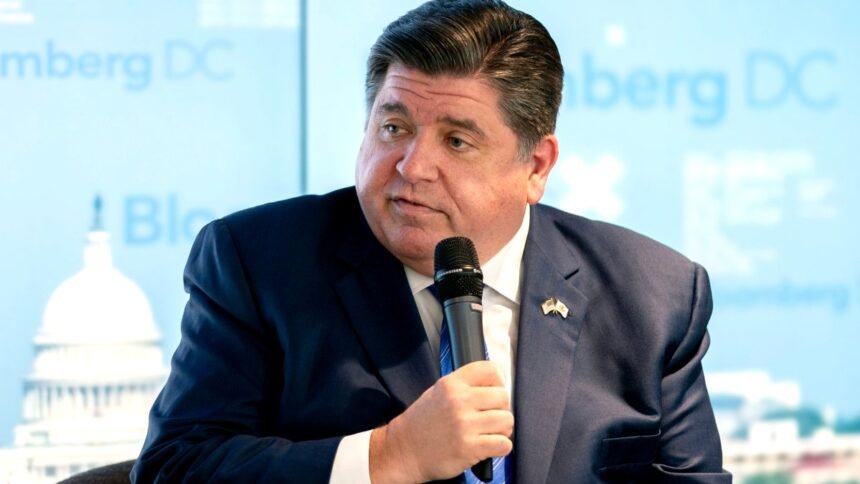The Chicago Bears are pushing to build a new stadium in suburban Arlington Heights, and Illinois Gov. J.B. Pritzker was asked about a piece of legislation that could aid the project.
During a press availability Monday, Pritzker said that his administration is “still considering” a proposed bill that would help the Bears and other businesses to lock in property tax breaks and other incentives to help move along the proposed project at the site of the former Arlington Park International Racecourse.
“It’s something we’re still considering,” he said during an event at Advocate Health Care. “We’re going to evaluate what the costs are for the people of Illinois to do this, the benefits that come from attracting businesses as a result of providing that ability to use those tax dollars.”
Pritzker referred to a proposed bill that is known as a “payment in lieu of taxes,” or PILOT for short. A PILOT bill, according to the National Council of Nonprofits, allows for companies to freeze property tax breaks obtained to help facilitate a project. The Bears would then be permitted to negotiate an annual payment with local officials in lieu of a standard property tax payment.
According to Crain’s Chicago Business, a separate program would allow the Bears to tap into the expanded sales tax revenue the project in Arlington Heights would generate.
Pritzker said that the bill would benefit more than just the Bears, which is why his administration would consider signing it if it hit his desk.
“I would just say that there’s a bill, it applies to much more than just the Chicago Bears. So it isn’t about the Chicago Bears. There are a whole lot of places where there can be benefit to the PILOT bill,” he said.
If the Bears move ahead with a new stadium project, season-ticker holders have been given a glimpse of what it could look like.
During a Friday press conference, Bears President and CEO Kevin Warren said the team wouldn’t be able to move forward with its stadium project without such a PILOT bill passing in Springfield. According to the Daily Herald, one proposal in Springfield would allow the Bears and other companies to lock in their negotiated payments for up to 40 years.
Pritzker told reporters he would prefer the Bears to stay in the city of Chicago, but emphasized that the team could do what it would like in terms of its future home.
“Look, I’m a Bears fan. I’d like the Bears to stay in the city of Chicago. If they could, they’re a private business. They can choose to do what they like with their business,” he said.
The governor also maintained his opposition to providing additional taxpayer funding for the project, saying that the Bears needed to continue investing private money into the massive proposed construction project.
“I do not think that the taxpayers of the state of Illinois should be propping up what now is an eight and a half billion dollar valued business. They seem to be doing okay for themselves,” he said.
Pritzker did not rule out investing state dollars in infrastructure improvements around the proposed stadium site.
“And I just don’t think, you know, obviously all of us, we build roads for everybody no matter who you are. You know, we support business coming to or staying in the state of Illinois,” he said.
During that Friday press conference, Warren and Chairman George McCaskey reiterated that the Bears’ “sole focus” is on constructing a new stadium in suburban Arlington Heights.
Warren said weekly meetings are taking place between team leadership and village officials — and the team’s goal is to break ground by the end of 2025.
“We are still extremely focused on Arlington Heights, on building our stadium there,” the president and CEO stated. “That’s the plan.”
Warren said the team “strongly believes” Arlington Heights is the only place within Cook County that will permit the construction of a stadium with a fixed roof.
Prior to Friday’s news briefing, the Bears released a statement to NBC Chicago in May, saying they had “made significant progress with the leaders in Arlington Heights, and look forward to continuing to work with state and local leaders on making a transformative economic development project for the region a reality.”
The statement came after a spokesperson for Chicago Mayor Brandon Johnson said executive leadership from the team have “indicated they intend to prioritize the development site located in the Village of Arlington Heights.”
However, the spokesperson stated, “As the Mayor has said several times, the door remains open in the city of Chicago.”











